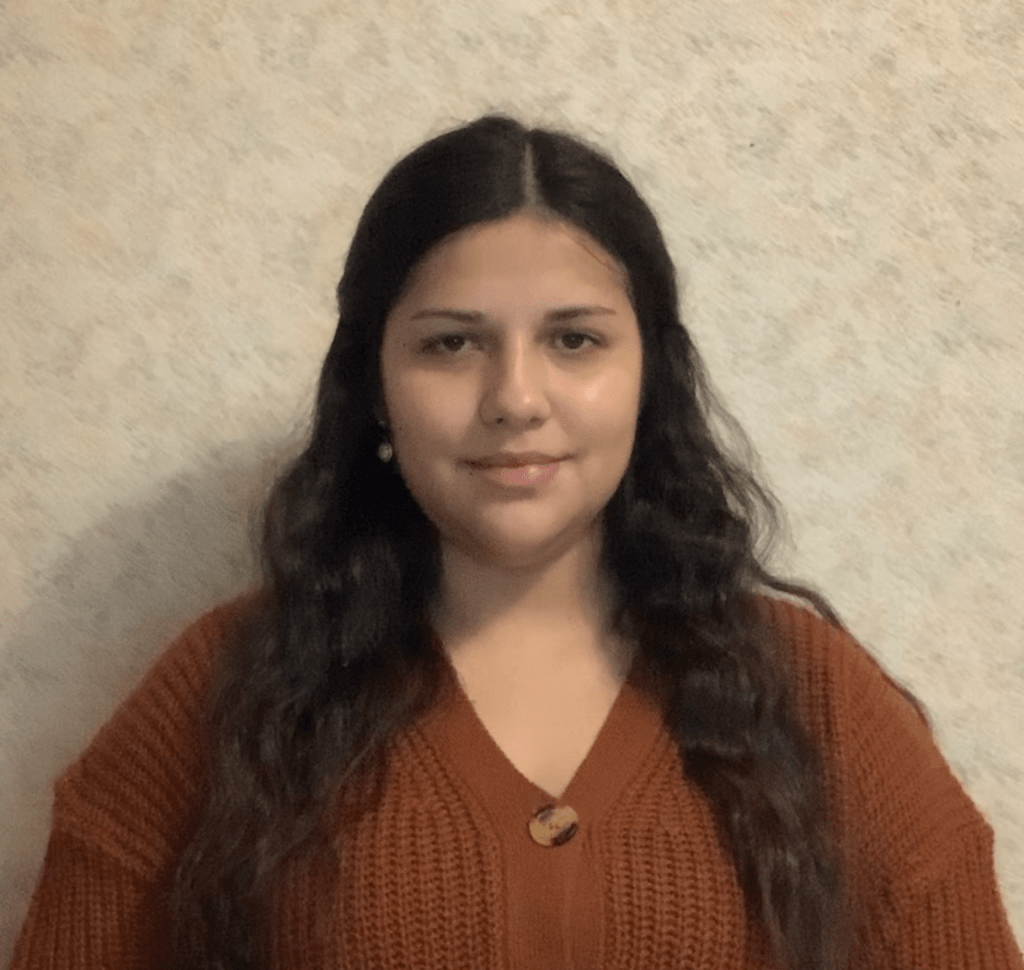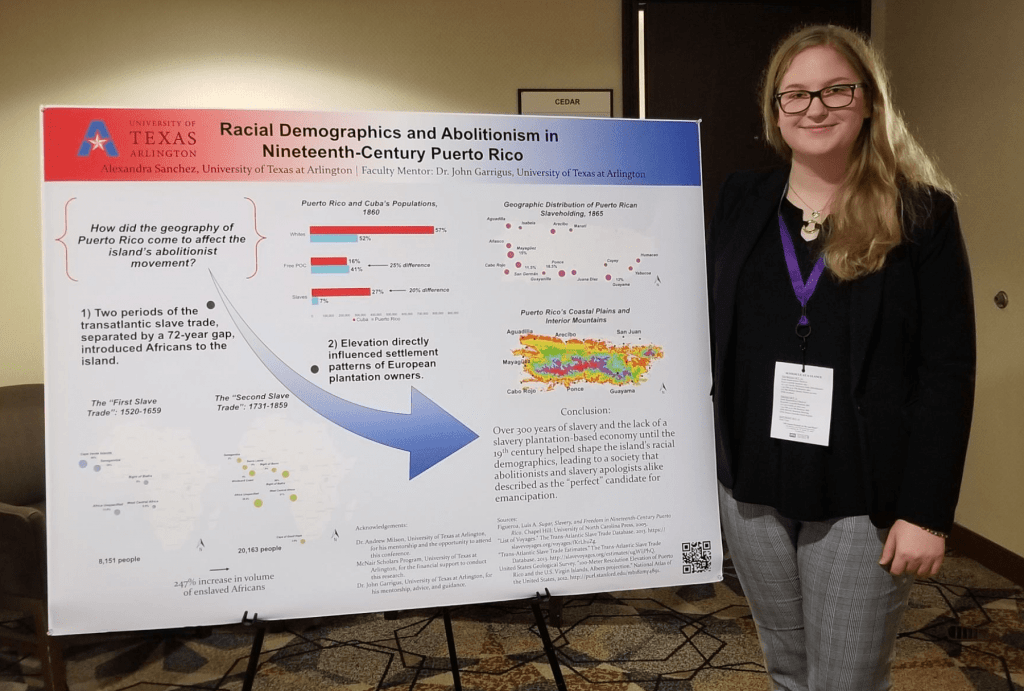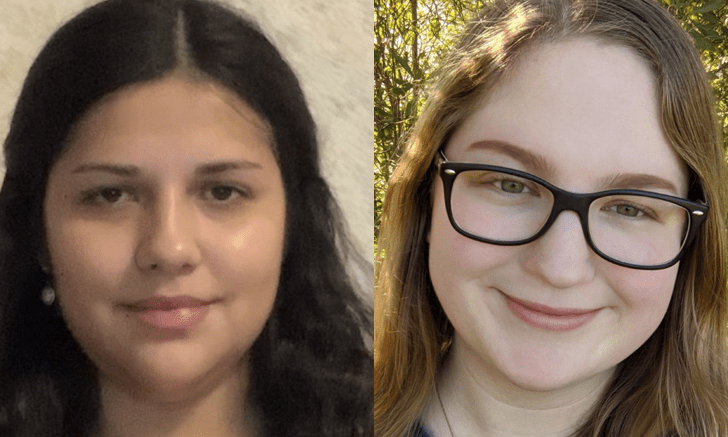The Center for Greater Southwestern Studies at UT Arlington was privileged to work with two outstanding undergraduate History majors during the 2019-2020 Academic Year. Alexandra Sánchez worked at the Center as an intern in the Fall, while Valeria Torres was an intern in the Spring. We hope we contributed, in some small way, to the formation of two scholars who are well on their way to becoming professors. Fronteras talked to them last week about their upcoming Ph.D. work and fond memories of UT Arlington.
FRONTERAS: We are excited about your acceptance into Ph.D. in history. What are your research interests and where will you be going next Fall to start your Ph.D’s?
Alex Sanchez: In the fall I’ll begin work on my PhD in Latin American History at Vanderbilt University in Nashville, TN. My research interests include 19th century slavery and abolitionism in the Spanish Caribbean, especially Puerto Rico. Coastal cities in Puerto Rico that had significant concentrations of enslaved Africans will be severely threatened by rising sea levels and other events stemming from global warming in this century. Puerto Rico is understudied when it comes to the slavery and abolitionism and the physical archives on the island have not been used extensively in historical research. I want to see what these civil and ecclesiastical archives contain and help digitize them before they become further at risk.I also want to incorporate digital humanities into my research, especially mapping with GIS software. Vanderbilt has so many research centers, projects, and lectures series that I hope to become involved in, including the Slave Societies Digital Archive and the Center for Digital Humanities.

Valeria Torres: My research interests are in Mexican American studies, the U.S.-Mexico War from 1846 to 1848, and the Treaty of Guadalupe Hidalgo that ended the war. Specifically, I want to research how the war and the treaty affected the southwestern borderlands and its people. I want to look at what the Treaty of Guadalupe Hidalgo stated in terms of having Mexicans live in the new American territory, how American society incorporated Mexicans into U.S. land and how that affected Mexicans in terms of their status and livelihoods under a new government. My studies will be done at Texas A&M University in College Station because I got accepted into their 5-year Ph.D. Program. No words can describe how proud my family is that I will be the first student in my family to be going to graduate school to obtain my Ph.D. Overall, I am overjoyed to be studying at Texas A&M University and I am very appreciative of the History Department there for giving me this lifetime opportunity to achieve my academic dreams.
Alex Sánchez: The three most important courses I took were Colonial and Modern Latin American History, both with Dr. David LaFevor, and Caribbean History with Dr. John Garrigus.
Fronteras: What UTA history courses were instrumental in shaping your research interests as scholars and why?
Alex Sanchez: Sure, the three most important courses I took were “Colonial and Modern Latin American History,” both with Dr. David LaFevor, and “Caribbean History” with Dr. John Garrigus. In Dr. LaFevor’s courses I realized that I had so much to learn about Latin America that public-school social studies curricula excluded. I also learned that several countries and regions are severely understudied. These courses shifted my historical interest to Latin America more broadly. In Dr. Garrigus’s course we had a semester-long “country project” in which we wrote several papers on an island of the Greater Antilles. I chose Puerto Rico partly because I wanted to learn more about where my partner is from. Several parts of the project dealt with slavery in the Caribbean and in the following summer during the McNair Scholars summer research internship I continued to research slavery in Puerto Rico under Dr. Garrigus. I learned how severely understudied Puerto Rico is, especially in the context of the transatlantic slave trade. Caribbean History is the course that helped define my interests more clearly and I will continue to study similar themes in graduate school.
Valeria Torres Without a doubt, it would be the course titled “Introduction to Historical Research” taught by Professor Wendell Hunnicutt. This course opened my interest in the U.S.-Mexico War when I first laid my hands on the Treaty of Guadalupe Hidalgo located at UTA’s Central Library Special Collections. Looking at the document in person and researching other documents from the mid-1800s concerning the war and treaty drew me into a time period in U.S. history that would change its geographical, societal, political, and economic standpoint for years to come. I would also like to mention Professor Kenyon Zimmer’s course “Immigration in U.S. History.” It taught me about the different ethnic groups who immigrated to the United States and their acculturation to American life. This further sparked my interest in choosing to concentrate my future graduate research on how the Treaty of Guadalupe Hidalgo affected the immigratory status of Mexicans in the U.S. Overall, I would like to thank Professor Hunnicutt and Professor Zimmer for being outstanding educators and giving me advice that would help me apply to Graduate School.

Fronteras: Tell us a little about the projects you worked on at the Center for Southwestern Studies at UTA.
Alex Sanchez: Last fall when I interned at the Center, I was lucky to have the opportunity to work with archival materials housed at the UTA Libraries Special Collections. I translated broadsides from Spanish to English for A Continent Divided: The U.S.-Mexico War website. It was a really cool experience getting to handle these materials and getting to work through the trickier translations with Dr. Conway. The experience was helpful in learning some of the differences between modern and nineteenth-century Spanish, something that will be very useful as I proceed in my graduate studies.
Valeria Torres: For weeks I researched what La Raza Unida was as a political party in the 1970s and how this party fought for the rights of Mexican Americans. I also researched the founder of La Raza Unida Party, who was Jose Angel Gutiérrez and other important leaders that contributed to the building of La Raza Unida Party such as Eva Bonilla, Rosie Castro, and Olivia “Evey” Chapa.
Valeria Torres The projects I’ve worked on so far have been researching and planning for La Raza Unida Event that was held back in February 2020. For weeks I researched what La Raza Unida was as a political party in the 1970s and how this party fought for the rights of Mexican Americans. I also researched the founder of La Raza Unida Party, who was Jose Angel Gutiérrez and other important leaders that contributed to the building of La Raza Unida Party such as Eva Bonilla, Rosie Castro, and Olivia “Evey” Chapa. Additionally, I also interviewed a writer who represented the rights of Chicano students during the 1970s while he attended UTA, Richard J. Gonzales. He would be the founder of the Association of Mexican American Students or AMAS at UTA. Currently, I am working on research to further develop a website for the Center for Southwestern Studies at UTA, such as gathering articles and books that have a correlation to the southwestern borderlands. Overall, this has been a beneficial research project to be working on as my academic interests fall in the same category and thus, have given me a variety of book options to further my historical research.
Alex Sánchez: “There are so many things about life at UTA that I’ll miss…”
Valeria Torres: “Most of all, I will miss the friendships I have made in the past four years…”
Fronteras: What will you miss about UTA?
Alex Sanchez: There are so many things about life at UTA that I’ll miss. I’m going to miss seeing my friends and co-workers, giving incoming freshmen here for Orientation advice during the summer, waking up early on a winter exam day to complete silence as I walk to the café for breakfast. All the small things that became nostalgic the moment I realized that I wouldn’t get to experience them again. I’ll also miss hanging out in the LAC (Language Acquisition Center) in Trimble Hall before class. I would spend time there in the morning doing homework, studying for exams, and catching up with classmates who studied there too.
Valeria Torres I will miss UTA’s friendly environment and resources they had available for students to feel more at ease within the campus such as their Tail Waggin’ Wednesdays, whose therapy dogs put a smile on every student’s face. Most of all, I will miss the friendships I have made in the past four years and the guidance and support from all my professors that helped me succeed in my undergraduate course.

